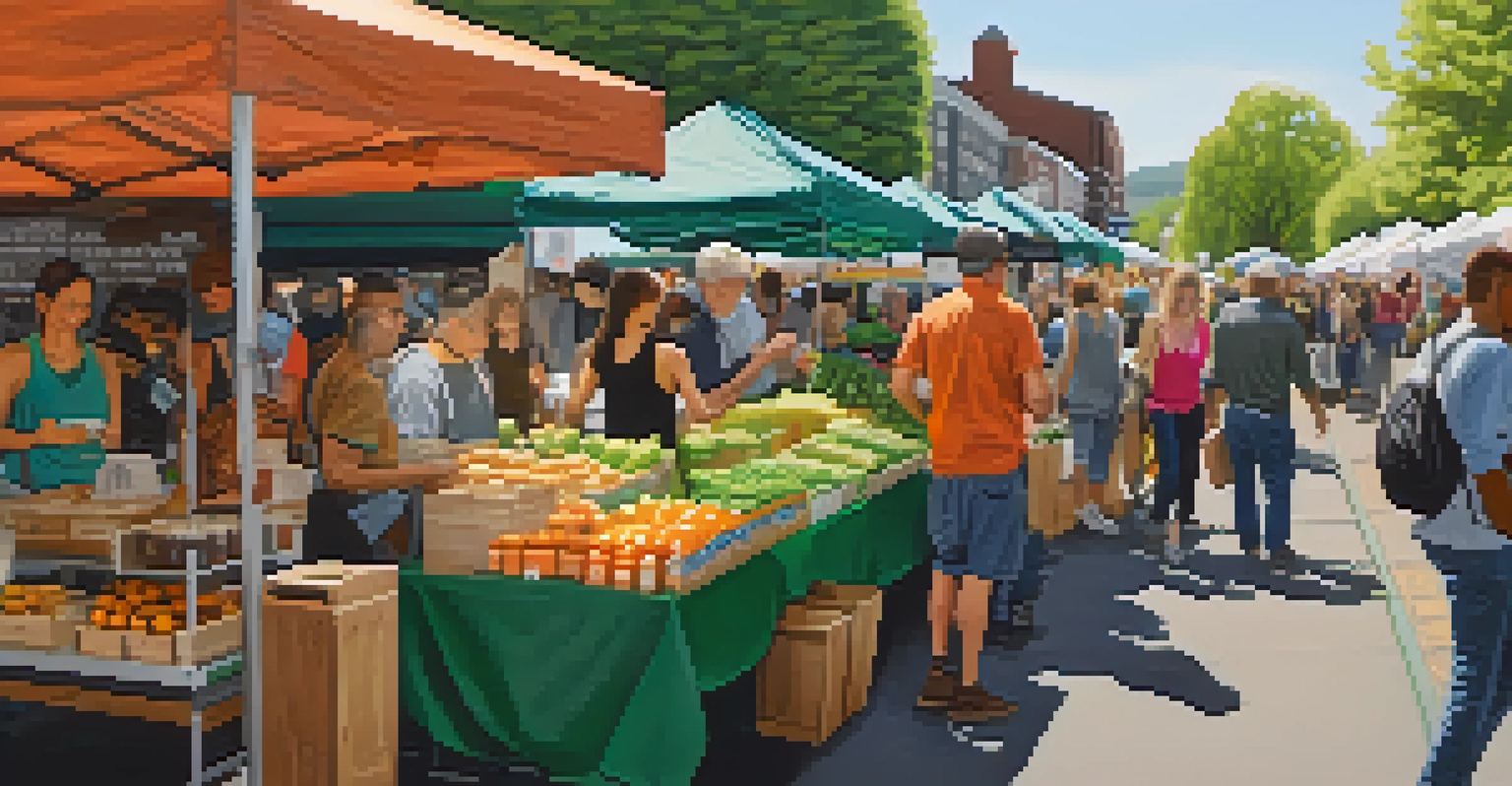Sustainability in Portland's Coffee Culture: A Deep Dive

The Rise of Sustainable Coffee in Portland
Portland has become a beacon for sustainability, particularly in its vibrant coffee culture. With a growing awareness of environmental issues, coffee lovers in the city are increasingly seeking out sustainable options. This movement reflects a broader trend where consumers want to support businesses that prioritize ethical sourcing and eco-friendly practices.
Sustainability is no longer a choice; it's a necessity for the future of our planet and our coffee.
Local roasters and coffee shops are stepping up, often featuring beans sourced from farms that prioritize both quality and sustainability. By choosing to support direct trade relationships, these businesses help ensure that farmers receive fair compensation while promoting environmentally responsible farming techniques. This not only benefits the planet but also enhances the flavor and quality of the coffee served.
Moreover, Portland's commitment to sustainability goes beyond just the beans. Many cafes are implementing practices such as zero waste initiatives and composting programs, ensuring that their operations have a minimal impact on the environment. This holistic approach makes Portland a model for how coffee culture can align with sustainability.
Understanding Direct Trade and Its Benefits
Direct trade is a key component of Portland's sustainable coffee movement, fostering a closer relationship between roasters and farmers. Unlike traditional fair trade, which often involves multiple intermediaries, direct trade allows roasters to purchase beans directly from producers. This not only ensures better prices for farmers but also allows roasters to maintain a high level of quality control over the beans they select.

In direct trade relationships, transparency is crucial. Consumers can trace their coffee back to the specific farm, understanding the conditions under which it was grown and harvested. This transparency builds trust and encourages coffee lovers to make informed choices about their purchases, supporting ethical practices in the industry.
Portland's Coffee Embraces Sustainability
The city's coffee culture thrives on ethical sourcing and eco-friendly practices, making it a leader in sustainable coffee.
Additionally, direct trade often leads to better environmental practices on the farms. Farmers are more likely to invest in sustainable techniques when they receive fair compensation, resulting in healthier ecosystems and higher-quality coffee. This creates a win-win situation for both producers and consumers, solidifying Portland's reputation as a leader in sustainable coffee.
Eco-Friendly Practices in Portland's Cafes
Many coffee shops in Portland are redefining what it means to be eco-friendly. From using biodegradable cups to implementing comprehensive recycling programs, these cafes are committed to reducing their environmental footprint. Some establishments even go a step further by sourcing their furniture and equipment from sustainable manufacturers, creating a cohesive green experience.
When we support sustainable coffee, we are not just enjoying a beverage; we are making a statement about the kind of world we want to live in.
Moreover, several cafes have adopted practices like using reclaimed water for cleaning and composting coffee grounds to enrich local soil. This not only reduces waste but also fosters a sense of community as customers see their coffee shop actively contributing to environmental sustainability. Customers appreciate these efforts and often feel more connected to their favorite cafes.
The focus on sustainability extends to the menu as well. Many cafes offer plant-based options and locally sourced pastries, aligning with the values of health-conscious consumers. This commitment to eco-friendly practices enhances the overall customer experience while promoting a healthier lifestyle.
The Role of Consumer Education
Consumer education plays a vital role in Portland's sustainable coffee culture. As more people become aware of the impact of their choices, they are more likely to seek out environmentally friendly options. Coffee shops and roasters often host workshops and tastings to educate customers about the importance of sustainable practices and the journey of their coffee from farm to cup.
Social media has also become a powerful tool for spreading awareness. Many local cafes share stories about their sourcing practices and sustainability initiatives online, engaging a broader audience. By highlighting their efforts, they inspire others to make conscious choices and support environmentally responsible businesses.
Direct Trade Enhances Coffee Quality
Direct trade relationships between roasters and farmers ensure fair compensation and promote better environmental practices.
Additionally, this emphasis on education fosters a community of informed consumers who value sustainability. When customers understand the significance of their purchases, they are more likely to advocate for sustainable practices within the industry, creating a ripple effect that can lead to widespread change.
Innovative Technologies Supporting Sustainability
Innovative technologies are playing a significant role in advancing sustainability within Portland's coffee scene. From energy-efficient brewing equipment to apps that track the carbon footprint of a cup of coffee, technology is helping cafes reduce their environmental impact. These advancements not only improve operational efficiency but also appeal to tech-savvy consumers who prioritize sustainability.
For instance, some coffee shops are using solar panels to power their operations, significantly reducing their reliance on non-renewable energy sources. Additionally, coffee roasters are investing in state-of-the-art equipment that minimizes energy consumption while enhancing the roasting process. This combination of sustainability and innovation positions Portland's coffee culture at the forefront of the industry.
Moreover, technology is enabling better traceability in the supply chain. With blockchain technology, customers can verify the origins of their coffee and understand the environmental impact of their choices. This level of transparency strengthens consumer trust and reinforces the importance of sustainable practices in coffee production.
The Impact of Climate Change on Coffee Farming
Climate change poses a significant threat to coffee farming, impacting both the quality and availability of coffee beans. In Portland, awareness of these challenges has prompted a proactive response from local coffee businesses. They are not only advocating for sustainable farming practices but also supporting research initiatives aimed at developing climate-resilient coffee varieties.
As temperatures rise and weather patterns become more unpredictable, some traditional coffee-growing regions may no longer be suitable for cultivation. This could lead to shortages and increased prices, affecting consumers and farmers alike. Portland's coffee community understands that addressing these issues is not just about protecting their favorite beverage; it's about ensuring the future of coffee farming globally.
Tech Innovations Boost Sustainability
Advancements in technology, such as solar energy and blockchain, are helping Portland coffee shops reduce their impact and increase transparency.
In response, many local roasters are prioritizing partnerships with farms that implement climate-adaptive practices. By supporting these initiatives, Portland's coffee culture is taking an active role in combating the effects of climate change while promoting sustainability in the industry.
Future Trends in Sustainable Coffee Culture
The future of Portland's coffee culture looks promising as sustainability continues to gain traction. Emerging trends indicate a shift towards more innovative practices, such as regenerative farming and enhanced transparency in sourcing. As consumers become increasingly aware of their environmental impact, the demand for sustainably sourced coffee will likely grow.
Additionally, collaboration among local businesses is on the rise. Coffee shops, roasters, and even local farms are joining forces to promote sustainability initiatives and share resources. This collaborative spirit not only strengthens the community but also amplifies the message of sustainability, making it a core value within Portland's coffee culture.

Ultimately, as Portland continues to lead the way in sustainable coffee, other cities may follow suit. The commitment to environmentally friendly practices and ethical sourcing can inspire a global movement, ensuring that the love for coffee remains strong while protecting the planet for future generations.